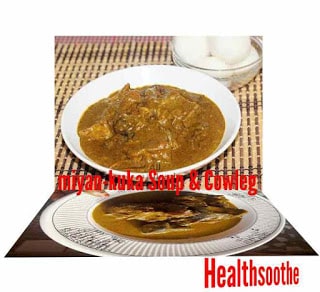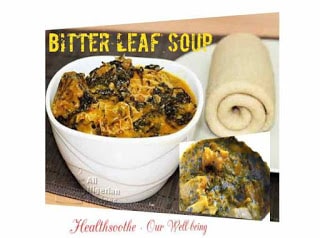Nigerian food and African food are better than other countries because they are fresh and are among the most nutritious food on the planet, despite the westernization of the African delicacy, Nigeria food remains one of the most health-friendly dishes globally. Dr. Dennis Burkitt, a famous British doctor who worked extensively in Africa, compared the kinds of diseases affecting the affluent in the Western world and poor Africans.
The African Bushmen he noted, seemed to be free of many of the chronic and debilitating diseases that afflict Westerners including diabetes, heart disease, cancer, and obesity. In his study, he attributed the variation in disease pattern to the quantity of dietary fiber consumed. While the Africans were consuming an average of 100 grams of fiber daily from a variety of plant sources, the average American consumes a mere 8 grams of fiber daily, a fraction of the 100 grams/day consumed by Africans.
Another study conducted by the Centers for Disease Control and Prevention finds a lot of food available in the workplace isn't healthy.
The study used data from a U.S. Department of Agriculture survey, focusing on purchases made by more than 5,000 employees from vending machines or cafeterias, as well as food available in the workplace for free.
Results suggest food purchased by employees tend to have lots of solid fats and/or added sugars. The food people get at work also tend to have high amounts of sodium and refined grains.
The study found that of the average 1,300 calories obtained weekly in workplace food, more than 70% came from free food. So, if you are Nigerian leaving oversea try as much as possible to get healthy Nigerian food.
The healthiest Nigerian food doesn’t just satisfy hunger they also rid the body of disease-causing elements and significantly boost immunity.
The Four Healthiest Nigerian Food Based on Available Scientific Data.
1. Bitter Leaf Soup (Ofeonugbo / olugbo)
Bitter leaf soup is the healthiest soup in Nigeria. It is a major delicacy in the northern and southern parts of the country where it is prepared using different recipes. A recent study published in the journal of food biochemistry describes bitter leaf as one of the few plants with huge anti-cancer properties. Bitter leaves have shown a very significant effect on blood pressure regulation, an effect which has been traced to its high potassium content. That makes it the no 1 healthiest Nigerian food and recipes.
Another research published in the American Journal of Biochemistry and biotechnology reported that bitter leaf is very useful in the reduction of blood glucose which makes it an equally useful remedy for the management of diabetes. For centuries bitter leaf soup has been used to relieve gastrointestinal disturbances arising from bacterial contamination of food and headaches an especially tension headache and migraine.
Ingredients for bitter leaf soup
- Washed and squeezed bitter leaf - A handful
- 10 small corms Cocoyam
- 3 cooking spoons Red Palm Oil
- Assorted Beef: Includes the best cut, shaki (cow tripe)
- Assorted Fish: Dry Fish or Stock Fish
- Pepper, salt and ground crayfish (to taste)
- 3 stock cubes
- 1 teaspoon Ogiri Igbo (traditional seasoning).
Cooking Directions for bitter leaf soup
- Boil the shaki (cow tripe), stockfish and dry fish in 1 liter of water until it tender and soft.
- Wash the beef thoroughly and pow the cow tripe; stockfish into a cooking pot, and continue cooking. When the meat and the fish is soft, add 3 cubes of Maggi/Knorr and cook for 5 minutes.
- Add pepper, ground crayfish, bitter leaves (if they have not been parboiled) and cook for 10 minutes. Then add the cocoyam paste (in small lumps) and the palm oil.
- You can parboil the bitter leaf to remove the bitterness, then follow step 3; add pepper, ground crayfish, the cocoyam paste (in small lumps), the bitter leaves and the palm oil. add all the ingredients at the same time.
- Cover the pot and leave to cook on high heat till all the cocoyam lumps have dissolved. You can add more water if you feel that the soup is too thick.
- Add salt to taste and the soup is ready to serve.
2. Miyan Kuka or Baobab Soup

Miyan Kuka is a soup popular in the northern part of Nigeria. It is made from powdered baobab leaves and dried okra. It is usually served with tuwonmasara, tuwondawa or the more popular tuwonshinkafa. Baobab leaves are rich in alpha and beta-carotene, Vitamin C as well as other nutritional elements such as rhamnose, uronic acids, tannins, vitamin A, potassium, calcium, catechins, tartrate, glutamic acid, mucilage. Miyan kuka serves many therapeutic and medicinal purpose due to the phytochemical composition of the baobab leaf.
The baobab leaf can act as an expectorant for a cough, diaphoretic or anti-pyretic agent. In some areas, it is used to relieve excessive perspiration and its anti-histamine properties make it very useful for the treatment of certain forms of allergy. Baobab leaves are also widely used in the savannah for the treatment of asthma, fatigue, inflammations, kidney diseases, gallbladder diseases, and dracunculiasis.
That makes it the no 2 healthiest Nigerian food and recipes
Before you cook Miyan Kuka
- Soak the dry catfish in some cool or lukewarm water. When soft, clean thoroughly and remove the bone.
- Grind all the spicy, I mean the crayfish, ogiriokpei, and pepper with a grinder.
- Cut the onion into a smaller size. Use one chunk of onion to get a better taste.
- Boil some water inside a kettle and set aside, you may need it.
- Cook the cow ribs with the seasoning cubes and onion.
Cooking Directions for Miyan Kuka
- When the meat is properly cooked, turn off the cooking gas, remove the chunks of onion then take out the meat from the beef stock and set aside in a clean pot.
- Add the kuka powder, spread it over the meat stock as you add the powder (this we allow the powder to penetrate inside the beef). Then stir very well with a spoon to ensure that you get a smooth mix without lumps.
- Add your pepper, crayfish and other ingredients that you have a blend and palm oil. Stir very well.
- Cover and cook for about 5 minutes or more on medium heat, stirring it from time to time. Kuka is very much like ogbono hence sticks to the bottom of the pot if not stirred often.
- After 5 minutes, add the cooked beef and some salt if necessary. Stir very well.
- Cover and once it boils again, it is ready to serve!
- Serve with any meal of your choice.
3. Egusi Soup
One of the major attributes that make Nigerian food healthier is the fact that most of them are made from rich plant sources. Egusi is a good source of palmitic acid, stearic acid, oleic acid, and linoleic acids.
Linoleic acid and linolenic acid, as well as other fatty acids, have been reported to have a protective effect against coronary heart disease and improved sensitivity to insulin. Studies have also shown that linoleic acid, an omega-3 fatty acid, lowers LDL concentrations, which are established risk factors for the development of coronary heart disease.
That makes it the no 3 healthiest Nigerian food and recipes
Ingredients for egusi soup
- 4 cups (500g) Egusi (Melon) seeds
- 3 cooking spoons red palm oil
- Beef: best cut and Shaki (cow tripe)
- Fish: dry fish and stockfish 1
- Medium sized Pomo 5
- Sharki (Tripe)
- Pepper and Salt (to taste)
- Vegetable: Nigerian pumpkin leaves, spinach or bitter leaf
- 3 small seasoning cubes
- 1 small ogiriokpei (optional).
4. Ewedu Soup
Ewedu is a leafy vegetable popular in southwestern Nigeria and is my favorite Nigerian food. Research has shown that the different varieties of ewedu possess very valuable vitamins and antioxidant properties with huge nutritional and therapeutic value.
- Ewedu contains vitamin A, a fat-soluble vitamin that plays a critical role in maintaining neurological function, healthy vision, and healthy skin.
- It contains Vitamin C which is important for repair and regeneration of tissues, it also prevents heart disease, scurvy, aids in the absorption of iron, and decrease the level of LDL in the bloodstream. In addition, ewedu contains Vitamin E another fat-soluble vitamin that is vital for certain aspects of reproduction.
- Half a cup of prepared ewedu will give you the following nutrients: 20 calories ,0.3 grams of fat, 3.1 grams of carbohydrate, 0.4 grams of fiber, 1.3 grams of protein, 87 mg of calcium, 22 mg of phosphorous, 1,334 IU of beta-carotene, 1 mg of iron, 0.02 mg of thiamin, 0.04 mg of riboflavin, 0.3 mg of niacin, 10 mg of Vitamin C, 48.9 IU of Vitamin E
- Ewedu is a great option for those trying to lose weight. 1 cup mixed ewedu soup with a handful large prawns and no oil has less than 100 calories in comparison to the same amount of Egusi with over 400 calories.
Ingredients for ewedu soup
- 6 Packed cups picked ewedu leaves
- 1 cup water
- 1 tablespoon blended egusi
- 1 tablespoon locust beans (iru)
- Salt – to taste
cooking Directions for ewedu soup
- Combine the egusi with 2 tablespoons of water. Set aside.
- Place a medium pot on high heat, add in the water and bring to a boil
- Add in the ewedu leaves. Reduce heat to medium and cook uncovered for 5 minutes or until leaves are softened
- Pour boiled ewedu into a blender and process until smooth ( this step is traditionally done with a local broom called “Ijabe'). The broom is used to pound the cooking ewedu until leaves are broken into tiny pieces)
- Return blended ewedu to the pot and add in iru, salt, and egusi paste. As soon as the egusi starts to curdle, stir
- Stir in more warm water at this point to your desired level of thickness (I added about 1 cup extra)
- Serve ewedu with stew and gbegiri.
Credit Sources
- 9jafoodie
- Publichealth
- allnigerianrecipes.com
- USA Today News

